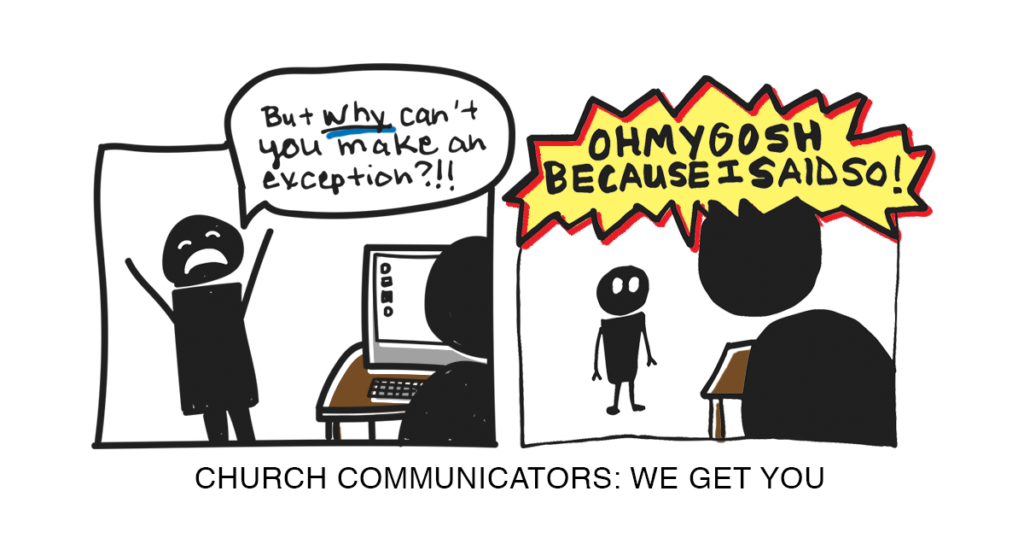As we approach Ash Wednesday and the beginning of Lent—which marks six weeks until Easter—it’s worth taking a moment to reflect on spiritual practices.
Growing up Baptist, we never embraced Ash Wednesday or Lent. In my experience, Baptists preferred to give things up permanently because they were inherently evil (i.e., alcohol, music with drums, two-piece swimsuits). And if something was deemed good, we didn’t give it up, but thoroughly embraced it—like potlucks.
In my experience, spiritual practices are often rooted in tradition and deeply misunderstood if you don’t have the same tradition.
Another misunderstood spiritual practice is fasting. Which is odd because it comes straight from the Bible and we have an example in Jesus. Before he began his ministry, Jesus went out into the desert and fasted for 40 days and 40 nights, and there he was tempted by Satan.
Not something I’d recommend for church communicators.
But sometimes church communicators approach Easter preparation like a fast:
- We won’t eat [normally] for 40 days and 40 nights (the six-week “go time” in our marketing plan).
- Some of us give up sleep, working late nights.
- Some of us live out the term “fast” literally—doing everything we can at top speed, which often means nothing is done well.
I’m not an expert in fasting, but I don’t think that’s how it’s supposed to work. Is it any wonder we’re exhausted? Tired? Burned out?
You Need Rest
Jesus said come to me and I will give you rest.
This Easter, I invite you to take part in the spiritual practice of rest.
You’ve surely seen all the ways that God has worked rest into his plan:
- The very act of creation included rest on the seventh day.
- That became a model for the Sabbath Day, when people were expected to rest (complete with detailed rules about how much work was allowed).
- Every seven years the fields were to lie fallow and rest.
- Every 50 years was supposed to be a Jubilee year of rest and reset.
- The stories we have of Jesus include multiple times when he escaped the crowds to pray and another time when he nearly slept through a storm. Jesus understood the importance of rest and recharging.
Yes, you have a lot of work to do as Easter approaches. But pace yourselves. Make room in your schedule to rest and recharge. Please, we implore you, take care of yourselves.
5 Tips for Surviving the March to Easter
We’ve been doing this a long time, and we’ve got a few tips for how you can survive the build-up to Easter:
1. It’s Not a Sprint
The most important thing you need to understand is that preparing for Easter is not a sprint. This is not a six-week season where you’re just going to have to be busy, and you can rest after Easter.
That’s not sustainable.
Breaks and rest and vacation should be a normal part of your work.
Late nights at the office or bringing work home should not be a normal part of your work.
You need to take care of yourself now, when it’s the hardest, because otherwise you’ll never do it. And you’ll just burn out.
Make this Easter different. Start some new habits. Implement some new practices.
2. Get a Pep Talk
Sometimes we all need a pep talk. We need someone to inspire us when we’re down, someone to rally us when we feel like giving up.
- Maybe you need to be inspired to face Easter preparation this year.
- Maybe you need to be challenged to take care of yourself.
- Maybe you just need that extra push of encouragement.
Well, we can help you there. We wrote the book. It’s called You’ve Got This: A Pep Talk for Church Communicators and it’s written by the delightfully real Kelley Hartnett. You can even get a free sample, so check it out and be encouraged.
And if you’re too busy to read, it’s even illustrated.
3. Take a Break
We already talked about the biblical emphasis on rest. So take a break. Make sure that rest is a regular part of your rhythm:
- Daily breaks: You can’t chain yourself to your computer. Take breaks throughout the day to get up and stretch, walk around, let your eyes re-adjust. Instead of working through your lunch, take that time to be away from work. If you need to feel productive, have lunch with your team but don’t talk about work. It’s good to build camaraderie.
- Weekly breaks: Too often weekends don’t feel like much of a break anymore. If we spend all week at work and then all weekend working at home—whether we brought work home or we’re doing house work—we’re doing it wrong. Take at least one day of the weekend completely off. Sleep in, go for a walk, read a book, watch a movie. Do whatever you do to relax. And if you have to work on Sunday, take another day during the week off.
- Long-term breaks: Coffee breaks and Saturdays aren’t enough to keep us well rested and fully charged for work. You need a vacation. Half the joy of a vacation is the anticipation, so plan a vacation now. More than a vacation, you might need a retreat. It’s OK to plan your own retreat and take a few days for yourself (because sometimes that family vacation isn’t quite the rest you’re looking for).
4. You Can’t Do It All
It’s easy to talk about taking a break, but work still has to get done, right? Well, not necessarily.
With all the demands on church communicators—bulletins, announcements, websites, social media, video, email newsletters, print newsletters, stage design, worship slides, mailers, handouts, posters, signs, billboards, ads, invite cards, and on and on and on—you can’t do it all.
Let me repeat that: You can’t do it all.
There’s a limit to how much you can accomplish between now and Easter. Even if you give up on all this healthy sustainable pace stuff, there are still only so many hours in the day.
You need to recognize your limits.
And learn to say no.
Or at least say “No, but…”:
- No, I can’t create a 48-page, full-color magazine with an online video series to welcome our Easter guests, but I can create a welcome card and a 30-second video.
- No, I won’t add an insert to the Easter bulletin to promote your niche ministry, but I can set you up with a Facebook group you can manage yourself.
- No, I’m not going to design a new logo for your ministry. But let’s set up a time to talk about how it fits in with the larger vision of our church and what we can do to promote your efforts.
(That pep talk book has some more tips on how to say no.)
The goal is not to be the curmudgeon who refuses to do work. The goal is to be realistic about what you can actually accomplish.
5. Get Some Help
Finally, all this work and expectation is exhausting, right? Even if you set limits, even if you take breaks, even with a helpful pep talk, and knowing it’s not a sprint—you still need to get the work done.
It’s OK to get some help.
- Delegate: We already covered that you can’t do it all, but you definitely can’t do it all yourself. “Kill the do-do head,” says Kelvin Co. “The more you do the less you lead.”
- Hire help: Adding budget for more staff or recruiting new volunteers is probably a long shot before Easter. But maybe that’s something you need to start thinking about. Outsourcing could be another option. Are there some things on your plate you could pass off to someone else?
- Do less: Another way to get help is recognize your limits and cut back on a few things. Talk to your supervisor and be honest about how you need help to get things done. If new staff, volunteers, or outsourcing aren’t an option, maybe cutting back on the demands is an option.
- Rely on resources: You don’t have to create everything yourself. There are plenty of pre-made resources out there, from social media graphics to branding to invite cards. Or use them as templates so at least you’re not starting from scratch. There are also loads of resources that can educate you on new technologies, more efficient systems, or how to rework your communication and be more effective. There are lots of options, but we’ll happily plug our membership site, Courageous Storytellers. New content every month around a specific theme, plus access to more than two years worth of archived resources. You need help? We’ve got help.
Take Care of Yourself
Too many church communicators work too hard as we approach some of the holiest days in the church calendar. Before you know it we’ll be celebrating the hope and joy of the resurrection of Jesus Christ.
Don’t work so hard that you’re too exhausted to feel that newness of life.
Don’t suffer silently behind a false facade and be so overwhelmed with bitterness that you can’t behold the amazing grace.
Don’t be so busy that Easter becomes just another job.
To paraphrase Jesus, “What good is it for someone to fill their entire church at Easter, yet forfeit their soul?”
 Need More? 3 Easter Resources:
Need More? 3 Easter Resources:
- Get more Easter ideas with our growing collection of articles, examples, and more.
- Check out our book, Super Sunday: Planning Easter for Your Church, for tips on how to plan, promote, and survive Easter.
- Go deeper for even more Easter resources and join our Courageous Storytellers Membership Site. You'll get access to downloadable resources including planners, guides, worksheets, graphics, and more.







Paul Steinbrueck
February 27, 2019
Good advice, Kevin. I would expand on #5… Don’t just get help but develop a communications team. There’s nothing worse than feeling “it all falls on me,” and conversely there is nothing knowing “we’re all in this together.”
I am more convinced than ever that HOW we do things as a church is more important than WHAT we do. Jesus never said, “By this everyone will know that you are my disciples, if you produce and promote a great Easter service.” He said, “By this everyone will know that you are my disciples, if you LOVE one another.” My goal is that everything I do in this life be done in a way that overflows with love and that includes doing communications with a loving team.